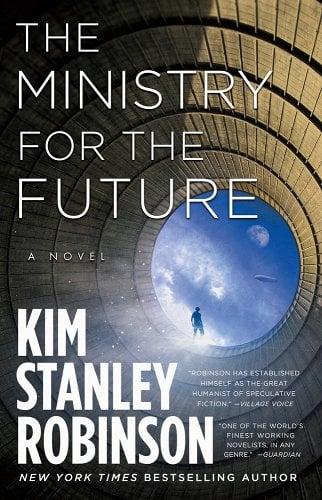
EDC Book Club
Public Group
Public Group
Active 2 days ago
A place to share books worth reading, and also a place to meet now and then to talk about them.... View more
Public Group
Ministry for the Future by Kim Stanley Robinson
-
Ministry for the Future by Kim Stanley Robinson
Posted by Anand Pandian on January 13, 2024 at 11:39 amWe’re kicking off the EDC Book Club with a discussion of this recent cli-fi novel by Kim Stanley Robinson. Please share your thoughts about the book in this discussion thread, and join us if you can for a live discussion on Wednesday, January 24th:
community.ecodesigncollective.org
EDC Book Club: Ministry for the Future by Kim Stanley Robinson
"We’re in a science fiction novel, as a culture. Science fiction is the realism of our time, as I’ve been saying over and over again. It’s the best way to describe the world that we’re in." We're kicking off the … Continue reading
Michael Degani replied 5 months, 2 weeks ago 3 Members · 9 Replies -
9 Replies
-
What a great live discussion today! Thanks to everyone who attended. Folks who are interested in this book but couldn’t be there with us, here are some of the things we talked about, please feel free to chime in and we can continue the discussion here.
We talked a lot about transition and what propels radical change, whether events like a terrible heat wave, or shifts of prevailing narrative and imagination. The book gives us a picture of technological hinges, like the invention of the carbon coin, but there is also something more intangible at work here, as @Sue reminded us, a commitment to assigning value to future people, in the face of all these inherited ways of discounting the value of future generations. We talked about the challenge of nurturing such connections to future descendants through practices in the present such as care, support, and community, as we see with Mary and Frank in the book. And the way in which attending to such care changes our sense of what to look for in a narrative, especially an Anthropocene narrative, with the invitation of Amitav Ghosh and others to think beyond hero stories. Here, we find protagonists who are present more as witnesses than as heroes, who engage in small acts of care and afford us witness to the momentum of systemic shifts. For the radical changes documented in the book happen through an accumulation of acts, often clandestine, propelling unexpected change.
-
Great summary! And such a pleasure to be in conversation with everyone.
As an alternative to the hero’s journey, I mentioned Gail Carriger’s Heroine’s Journey, which talks about a different (not gendered) narrative structure where the protagonist’s connection to family and community is broken and the arc of the story is about rebuilding community/family, making allies, compromise not revenge, and ultimately reconnection as the goal. Highly recommend.
I’m also going to look up Ghosh’s 2019 novel Gun Island (recommended by Holden), that I’m hoping is his personal response to his own critique of the lack of capital-L literature engaging with the Anthropocene, especially with stories of collective (in The Great Derangement).
Anand also mentioned Ursula K. LeGuin’s Carrier Bag of Fiction, which is a very short essay that I re-read often, almost as a devotional, my little purple copy with a preface by Donna Haraway that is likewise powerful. “It is hard to tell a really gripping tale of how I wrested a wild-oat seed from its husk, and then another and then another…” but it’s precisely this story of building and care that needs telling. This collective story of all of us, our parts in surviving the Anthropocene and possibly rescuing the future from disaster… the stories that got us into this mess are unlikely to be the ones that get us out.
-
-
I enjoyed the conversation, and want to follow up on one point:
One of the real strengths of the book as a kind of cultural road map is to take seriously the power of money and its incentives in driving the plot’s events, thus helping us ordinary people see the anchoring role of central banks and finance in any transition (i.e. ‘putting our money where our mouth is’). To whit, as recently as eight months ago, KSR was endorsing the carbon coin.
-
I looked through my notes, trying to find where I heard KSR walking back the Carbon Coin… and couldn’t find any links, just my notes about it. Separately, I did find this interview (https://www.youtube.com/watch?v=z6E34AYmY6A) where he was clear that he didn’t believe in blockchain or crypto as being “the answer.” And that people assume he endorses everything in the books, but he definitely doesn’t (especially the violence, but I think that was the context that I heard him caveat the Carbon Coin as well).
It was the part of the book I was least fond of — not that I have any hesitation about discussing money (or monetary policy) in the context of climate, but Carbon Coin felt way too much like a magic pill, a “tech will save us” (in this case money-tech) solution. Especially with how excited people got about it, I can see how KSR would be uncomfortable with that. Regardless, it’s certainly an idea that’s out in the wild and has (*cough*) currency now. And that’s fine. As KSR also has said many times, it’s an “all hands on deck” situation, so we have to consider all the options (I just hope we’ll reject the bad ones).
youtube.com
Kim Stanley Robinson | Climate Futures: Beyond 02022
Long Now continues our dialog with the acclaimed writer Kim Stanley Robinson around COP26 and his most recent book "The Ministry for the Future". Tickets for...
-
Thanks Susan. The “magic pill” quality of both the carbon coin and the geoengineering experiments was the one aspect of the book I was most reluctant to go along with. Good to know he’s continuing to weigh these matters.
-
I honestly find that a puzzling characterization of both elements. Solar geoengineering in the book required radical and defiant political will from a nation-state; carbon coin required central banks from the most powerful nation-states to back it. In both cases they are desperate actions held aloft by very specific political-ethical commitments, thoroughly human and vulnerable to mishandling in execution. (It’s like you said in the discussion Anand, money is just human trust materialized). They are not miracle pills; it’s a miracle they work! And just barely at that. If this is about evaluating the book as a work of cli-fi, I like that its willing to delve into boring stuff like monetary policy and able to surface the human drama in it.
-
Totally agreed, on the importance of all the relational and imaginative work it took to get to those interventions. Any change would require this. I was thinking about why these specific technologies were the ultimate fulcrum. You can organize collectively toward a commitment to many kinds of “instruments,” if you will. These seemed to have about them the gloss of a technofix, that’s all…
-
I’m glad to see you (Michael) put Carbon Coin and geoengineering both in the same bucket, because I have the same (negative) feelings about both of them. I see people get excited about these (and I do think of them as “technofixes”) because they think implementing them is “easier” than, say, wholesale change of the energy system or other social changes. Notably, neither of those requires any (substantial) change to the status quo of capitalism or even a fossil fuel usage. And they’re framed (especially geoengineering) as something we have to try because we’re “desperate” (but not desperate enough to have a wholesale reconfiguration of economies). I don’t have expertise to say what the risks are with a Carbon Coin, but one of the older geoengineering concepts (pumping sulfate aerosols in the atmosphere) is literally what I did my PhD research on — and I feel very safe in saying that humanity is nowhere near smart enough to do this without terrible unforeseen consequences. So that’s the side-eye I bring to almost any geoengineering proposal (and Carbon Coin feels like financial geoengineering): that it will cost an ungodly amount of money, has tremendous risks, and is fixing the wrong thing (while enabling the status quo to continue).
Or we could just build out renewables and outlaw stock buybacks. 🙂
-
I think you’d do better to take each proposal on its own merit rather than make spurious analogies between them. Bemoaning any and all concrete action short of utopian revolution sounds like bad politics and even worse cli-fi.
-
-
-
-
-
Log in to reply.



